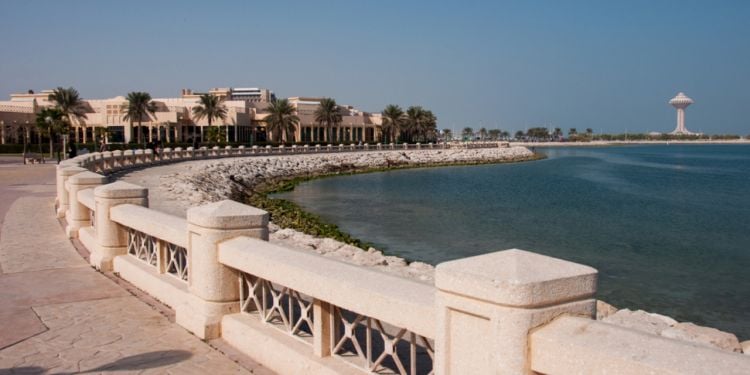
Al-Khobar is the dynamic metropolitan city of the Eastern Province. Along with Dammam and Dhahran, the cities form the so-called Greater Dammam, given the small distance between the two cities and their similarities. Khobar is home to some of the biggest malls and entertainment centers in Saudi Arabia. The large expat community residing in Al-Khobar and nearby has helped Khobar become the diverse, bustling city it is today.
The city is hugely impacted by the petroleum industry, which drives foreign talents from around the globe. Saudi Aramco, the national oil company and the most profitable entity in the world, is the leading employer in the region. A large number of expatriates also work in industrial ports. With so many sectors growing rapidly, Khobar is an attractive place to seek employment.
Key industries in Khobar
Over the years, the city has transformed into a commercial hub, thus becoming a key player in the country's economy. One of its main activities is goods and passenger transport. Besides being a major transit spot, Khobar also relies heavily on the import and export fields.
Besides, Khobar hosts many banking and financial institutions, as well as hotels. You are also likely to find many international firms which are turning the city into one of the country's leading business and commercial hubs. The production of industrial gas, dairy, carbonated water, paper, silk production, and garments are other important economic pillars.
It is considered that, unlike other cities in Saudi Arabia, Khobar's population consists of more expats than locals due to the number of international companies operating there. However, this might change under the Kingdom's Saudisation policy. In 2022, Saudi citizens in Khobar made up only 35% of the population.
Job hunting in Khobar
Note that to work in Khobar (and in Saudi Arabia in general), you will need to secure a job offer in advance, prior to your arrival in the country. This way, you will be able to secure an Iqama (work residence permit) that allows you to legally work in the country.
Because of this, job hunting in Khobar can be tricky — and will need to be done primarily online or via previously established connections.
If you are starting your job search from scratch, it's best to first check out popular job search websites. This will give you a chance to not only look through available job opportunities but also get a better idea of the job market in general: specialties that are in demand, the salary range in your field, and more.
Check out websites like Bayt, Edarabia, Naukrigulf, Mihnati, and others. International career websites are also a good place to start — check out MonsterGulf, Glassdoor, Indeed and others.
Applying for a job in Khobar
Due to new Saudisation laws that require companies to hire a specific number of Saudi nationals, Saudi employers are looking for expats with specific expertise — so that the hires they make are justified. This is why it is very important that you clearly define your skills when applying for a job in Saudi Arabia. Basically, you and your employer will need to prove that you have the experience and expertise that will justify hiring you over a Saudi citizen.
Here are a few guidelines for composing a CV for Saudi Arabia:
If you are applying for a position that is meant for an expat, feel free to send out a standard Western-style CV — about one page long. You can compose your CV in one of the popular formats: chronological, skill-based or mixed. In a chronological CV, you will be listing your work experience in reverse order, starting from the latest position. In a skill-based CV, you will focus on the skills and expertise that you want to highlight. A mixed format CV combines the elements of both these formats.
In most situations, you will be able to send out your CV and cover letter in English. Unless, of course, the position you are applying for specifically requires knowledge of Arabic — in this case, it will definitely be a good idea to add copies of your CV and cover letter in Arabic as well.
Another important thing to keep in mind is that your CV and cover letter should be tailored to the position you are applying for. This will be especially important for your employer as Saudi employment guidelines require expatriate hirings to be well justified. Make sure to do some research on the company you want to work for, their requirements, vision, mission and more—all of these can be incorporated into your application. Besides, you can also pay attention to the style and wording of the job offer itself and use similar language when writing your application.
How to apply for a working visa to Saudi Arabia
To work in the country legally, you will need to have a valid Iqama. Your employer will be the one applying for the Iqama on your behalf. The Iqama is a national residency permit given out to foreigners who live and work in Saudi Arabia. It explains the reason for your presence in the country, the type of work you are doing here and who you are employed by.
An Iqama looks like an ID card and includes the following information:
- Your legal name and nationality;
- Your date of birth;
- The Iqama number;
- Your religion;
- Your job title and the name of your employer.
Important:
You must carry your Iqama card with you at all times. If you are stopped by police in Saudi Arabia and don't have your Iqama card with you, you could be facing a fine of upwards of SAR 3,000 and even a jail term of up to six months.
If you have lost your Iqama card or if it has been stolen, you need to immediately report it missing. If you haven't reported that your card has been lost in time, you could also be fined in the amount of up to SAR 3,000. Overstaying in the country on an expired Iqama can result in deportation.
How to apply for an Iqama?
The Iqama application process is initiated by your employer. They will start by submitting an application with the Ministry of Labour and Social Development. Once the Ministry of Labour and Social Development issues a permit for your employer to sponsor an expat employee, they will receive a Visa Authorisation number and a Power of Attorney through the Ministry of Foreign Affairs.
Once you arrive in Saudi Arabia, you and your employer will have 90 days to apply for the Iqama visa for you. Once you have received your Iqama, you will be able to use it to apply for Iqama permits for your family members. In this case, the Iqama issues to your spouse and children will not be tied to your employer but to you.
Important:
The only way to be legally employed in Saudi Arabia is by applying for and receiving a work visa. If you try to work in Saudi Arabia illegally and get caught, the penalties can be quite severe. You may have to pay a fine of up to SAR 10,000 and are also likely to be arrested and deported.
What is a special privilege Iqama?
When learning about working in Saudi Arabia, you will also come across the term “special privilege Iqama”. This a fairly new type of residence permit launched in January 2019 and issued to highly qualified foreigners willing to work in Saudi Arabia. Special Iqama holders also get access to additional privileges like owning real estate, renting out real estate, and more. A Special Privilege Iqama Center has been created to regulate everything related to the new Iqama.
How to work in Saudi Arabia for a short term?
If you need to be in Saudi Arabia for work for a shorter term, you have two options: you can apply for a work visit visa or a business visit visa.
A work visit visa is meant for those working in foreign companies in Saudi Arabia and intending to stay for a period of up to 90 days.
A business visit visa will let you conduct business transactions with a Saudi company. It lets you stay in the country for up to 90 days.
Working hours in Saudi Arabia
A standard working day in Saudi Arabia lasts from Sunday to Thursday from 8 am to 6 pm or from 7 am to 7 pm with a longer lunch break. The maximum daily hours for an employee is 8 hours.
Fridays and Saturdays are days off. The working week lasts for a maximum of 48 hours and is shortened to 30 hours per week during the holy month of Ramadan.
Most employees get 21 days of paid leave. After you've been in employment for five years, your paid leave will be extended to 30 days.
There are four main public holidays in Saudi Arabia. The number of days off you receive during each holiday depends on whether you work in the public or private sector:
- Eid Al Fitr (three to seven days);
- Eid Al Adha (three to seven days);
- Saudi National Day (23 September);
- Founding Day (22 February).
Lifestyle in Khobar
With its waterfront and picturesque corniche overlooking the Persian Gulf, Khobar is a friendly, relaxed, and attractive city for leisure time and living. It is also home to multiple parks.
We do our best to provide accurate and up to date information. However, if you have noticed any inaccuracies in this article, please let us know in the comments section below.








